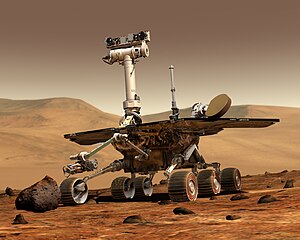 Columbus Lab that was attached to the ISS today. The Atlantis shuttle carried up the Columbus module on its launch, and on Monday two spacewalking astronauts attached a handle to Columbus that allowed the robotic arm operator to grab hold of the module and delicately lift it from Atlantis' cargo bay. The module was moved from the cargo bay to the right side of the Harmony module, which Discovery's astronauts delivered in December.
Columbus Lab that was attached to the ISS today. The Atlantis shuttle carried up the Columbus module on its launch, and on Monday two spacewalking astronauts attached a handle to Columbus that allowed the robotic arm operator to grab hold of the module and delicately lift it from Atlantis' cargo bay. The module was moved from the cargo bay to the right side of the Harmony module, which Discovery's astronauts delivered in December.The $2 billion, 10-ton Columbus laboratory, originally scheduled to be launched in 1992 to mark the 500th anniversary of Christopher Columbus' voyage to the New World, is Europe's main contribution to the space station. The module went online today around 9 am eastern time. After the lab's launch was delayed for months, and its actual attachment delayed slightly by one astronaut's sickness, it's finally up and working, and except for a minor cooling system glitch it is fully functional.
Also the new lab's ESA control center near Munich, Germany is now online, where 100 flight controllers and engineers are working in three shifts to watch over Columbus around the clock alongside U.S. and Russian operations centers.
Despite a small torn thermal insulation blanket on Atlantis' starboard aft engine pod, Atlantis is scheduled to return to Earth February 19, though that may be extended one more day so the shuttle crew can get a little more work done on the ISS. Also Japan's multi-module Kibo laboratory is due to launch toward the station later this spring.
In other news, European space officials are redesigning their planned ExoMars mission, hoping to substantia
 lly increase the planned capabilities; though this means doubling the nearly already $1 billion budget. European Space Agency head Jean Jacques Dordain says that their goals have increased, and their mission has changed dramatically, and this calls for a new name and a much higher budget. The mission is scheduled for launch in 2013.
lly increase the planned capabilities; though this means doubling the nearly already $1 billion budget. European Space Agency head Jean Jacques Dordain says that their goals have increased, and their mission has changed dramatically, and this calls for a new name and a much higher budget. The mission is scheduled for launch in 2013.And here are some links to a few stories that I found pretty interesting. Wired.com has an article about the upcoming Presidential Science Debate 2008, which they have finally set the date for. Also Darnell Clayton of Colony Worlds put up a very interesting post about a future lunar base contemplating some of the problems and solutions. And finally Frasier Cain of Universe Today wrote about Hubble finding the oldest galaxy ever found.
Thanks for reading, and don't forget to stop by on Thursday when I will be hosting the amazing, astounding, and astronomically awesome Carnival of Space.
Sources: BBC, Space.com
Picture Sources: NASA, Wikipedia.com
The Fool










